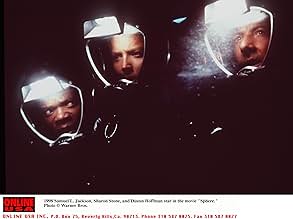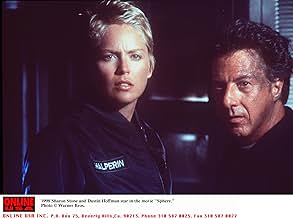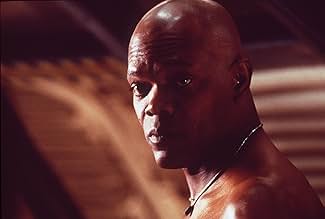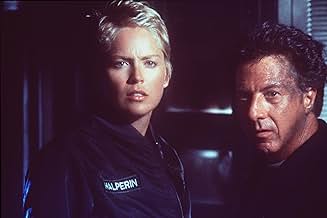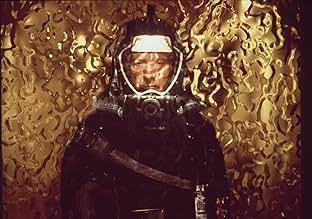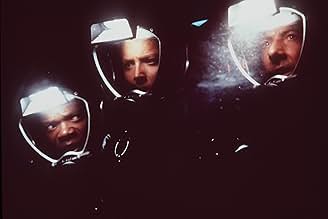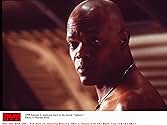Ein Forschungsteam untersucht ein abgestürztes Raumschiff auf dem Grund des Ozeans.Ein Forschungsteam untersucht ein abgestürztes Raumschiff auf dem Grund des Ozeans.Ein Forschungsteam untersucht ein abgestürztes Raumschiff auf dem Grund des Ozeans.
- Auszeichnungen
- 3 Nominierungen insgesamt
Empfohlene Bewertungen
I just don't get how "Sphere" wasn't a wonderful film!
You can feel so much potential in that opening half-hour. And there are so many good elements at play. But it just sort-of falls apart at times. It feels unfinished. (A sentiment also echoed by one of its stars, Dustin Hoffman.) It feels like it could use some tightening in some spots, some additional scenes in other places, some more work with the pacing and maybe a re-shoot or two. Then it could be a great, wonderful film. As it is now, it's merely "ok."
When a team consisting of a psychologist, mathematician, biologist and an astrophysicist are sent 1,000 feet below the surface of the ocean to investigate what could be an crashed alien spaceship, things take a bizarre turn when two revelations are unveiled. First, the ship might actually be human in origin, and second... a mysterious spherical object is found in storage on the ship, and it's influence could lead to the brink of disaster.
The performances are almost universally incredible in this film. Featuring the aforementioned Dustin Hoffman, we are also treated to the likes of Samuel L. Jackson, Sharon Stone, Liev Schreiber, Queen Latifah and Peter Coyote. And all are able to make a good impact, even when the script and storyline don't give them too much development as characters. The talent elevates the experience.
Director Barry Levinson does some incredible work here as well. Levinson (responsible for some great films) really treats the audience with a combination of intimacy and spectacle from scene to scene. His sense of storytelling, like the acting, elevates the entire feature. (Particularly admirable are some great scenes of horror and suspense. Levinson makes some interesting choices as to what he chooses to show and what he chooses to hide.)
And many other aspects of the production are equally high in quality. Elliot Goldenthal's score is magnificent and haunting. The cinematography of Adam Greenberg is perfect and gives a great aesthetic. Visual and practical effects are almost uniformly excellent. (Save for one or two "gory" effects that don't quite work.) Everything here just seems to work.
The problem, as said above, is that the film sadly doesn't feel finished. And I can't place my finger on any specific aspect of it that fails. It just needs... more work. Some parts of the film feel overlong and in need of trimming. Other parts are abrupt and feel like scenes and shots are missing. Some moments feel contrived and out of context. The pacing is all over the map. And it betrays everything that works so well. It's just a bit too sloppy in its current form.
I honestly think that if the film was given another month or so of time for post-production and editing (and maybe a week or two of re-shoots), it would have been infinitely better. Heck, it might have even been great.
But as is, the film's troubled storytelling and inconsistent pacing all but ruin the experience. Although I will contend that there is enough good here to make "Sphere" worth checking out. Even if only once for the sake of curiosity.
I give it about an average 6 out of 10. I'd say check it out if you see it on cable or available to rent. You just might like it.
On the seabed in mid-ocean a huge vessel is discovered. A team is dispatched to investigate - and what they find is beyond belief.
Admittedly there were a couple of scenes which I felt missed the intended realism of the film, and occasionally it seemed far too obvious what was going on, but the ending resolved everything beautifully.
I suspect that fans of action films will feel let down by the thought necessary to follow this film, and fans of science fiction may well feel that after the first half hour there is a lack of a traditional sci-fi element. Many people I'm sure will feel that too little is explained, but the point of the film is that it doesn't need to be - the message of the ending is strong enough that we don't need explanation.
I'd particularly recommend this film to anyone who likes psychological thrillers. I was fairly impressed by the action integrated in The Abyss, but Sphere far surpasses it in terms of plot. Most of all, if you like films that simply entertain, this is not for you. It's more about the reactions it causes in you when you follow the story. If you come away from this film unchanged, you've missed the point.
Barry Levinson is one of those directors who has no interest in art, or in invention, or in pretension, either. And so his films sometimes hit a popular strain that makes them take off. He has some terrible misfires, for sure, but his best films ("Rain Man," "Sleepers") have people who you relate to, and who have to confront something extraordinary.
That was the idea here, based on a Michael Crichton novel (that should have been a heads up). The cast is headliner stuff. Dustin Hoffman is particularly convincing, Samuel Jackson plays a great type, and Liev Schreiber is sharp. Sharon Stone is a dull fourth. They bond, and realize they have things in common, in the first minutes of the film as they converge and go under water to check out an alien spaceship. Even after they are deep below the surface and beginning their unlikely exploration they make a viewer connect. As much as it borrows from "Alien" and "Aliens" this could have been a good film on its own terms. Even the talking computer/alien has its own edge compared to HAL.
What goes wrong is the plot itself, and not acting, or even directing, can overcome that. As it gets hairier, we need it to be more plausible, not less. Events get increasingly chaotic, so that action and loud noise drive some of the scenes. Subplots are continued but seem increasingly meaningless (at one point, Hoffman and Stone are rushing into the water in an absolute emergency and they start to chitchat about their distant failed love affair). And finally, as people die off and the menace becomes more ambiguous, the movie becomes completely ambiguous, and as a kind of escape valve, announces that any number of crazy thing we have been watching may or may not have been imagined by one character or another.
But what does that mean about the camera? Isn't there still a differentiation between cinema reality and one character's delusion? Or if these are global delusions including the viewer, shouldn't they do more than simply disorient us? Well, don't hang on for answers. Just hang on. An explosion (of course) caps it all off (why they didn't hit the disarm button isn't explained), and a final logical wrap up that avoids the time travel paradox is warm and fuzzy.
Definitely the giant squid thrills are insufficient (note that Crichton devoted a good part of his novel describing encounters with 'the monster'). I guess animation artists were short budgeted...though the film as a whole still is a visual treat...and the atmosphere is rightly captured, with nice music.
Overall, I think the movie is worth watching and is definitely of a much higher caliber than 'The Lost World'. It follows a psychological-cum-sci-fi thriller theme and i feel is better than the similar flick 'Abyss'. As from the novel's point-of-view...it could have been done better though. 8/10 stars!
Wusstest du schon
- WissenswertesMany scenes, like Harry (Samuel L. Jackson) and Norman's (Dustin Hoffman's) conversation about making up the ULF report and dealing with Ted (Liev Schreiber), were completely improvised.
- PatzerWhen Jerry first makes contact, he transmits in code : "MY NAME IS JERRY". Later, the code is revealed to have been mistranslated and the message reads: "MY NAME IS HARRY" If the letters H, E, J, and A in the simple letter/number substitution code were wrong, the first message would have read: "MY NEMA IS JERRY". Also, the entire series of conversations they had would have exhibited the same error, yet none did so. (HAPPY would have been JEPPY, ALL = ELL, etc.)
- Zitate
Dr. Harry Adams: We're all gonna die down here.
Norman Goodman: What?
Dr. Harry Adams: You see? It's curious. Ted did figure it out - time travel. And when we get back, we gonna tell everyone. How it's possible, how it's done, what the dangers are. But then why fifty years in the future when the spacecraft encounters a black hole does the computer call it an 'unknown entry event'? Why don't they know? If they don't know, that means we never told anyone. And if we never told anyone it means we never made it back. Hence we die down here. Just as a matter of deductive logic.
- Crazy CreditsThe opening credits are cast over an invisible sphere.
- Alternative VersionenSPOILER ALERT: An alternate television edit has been shown with a simplified and more ambiguous ending that follows the shooting script; Harry warns them that the authorities are on their way to debrief them, and they will demand answers. The three survivors ready themselves to forget about their mission and the power they possess. Outside, a helicopter sets down. Subsequently, we see the three survivors being interviewed in a debriefing room after decompression, each shot individually against the same background. They react as if they're oblivious to anything going wrong in the Habitat, unaware of anything that happened to Ted, Barnes or the Sphere. The helicopter leaves, and the camera pans down to the ocean, where the Sphere supposedly still remains.
- SoundtracksHorn Concerto No. 3 in E Flat Major, K.447
Written by Wolfgang Amadeus Mozart
Performed by Vienna Mozart Ensemble; Herbert Kraus, Conductor
Courtesy of LaserLight Digital
By arrangement with Source/Q
Top-Auswahl
Details
Box Office
- Budget
- 80.000.000 $ (geschätzt)
- Bruttoertrag in den USA und Kanada
- 37.020.277 $
- Eröffnungswochenende in den USA und in Kanada
- 14.433.957 $
- 15. Feb. 1998
- Weltweiter Bruttoertrag
- 37.020.277 $
- Laufzeit2 Stunden 14 Minuten
- Farbe
- Sound-Mix
- Seitenverhältnis
- 2.39 : 1
Zu dieser Seite beitragen



